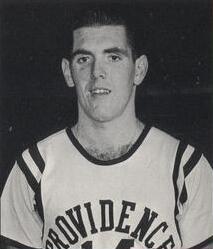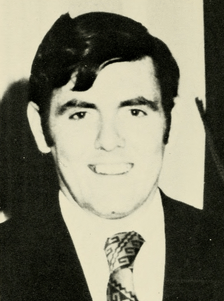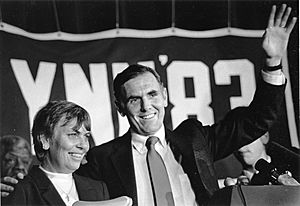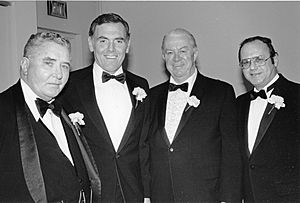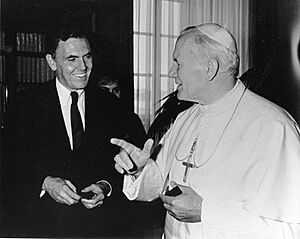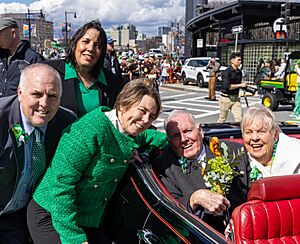Raymond Flynn facts for kids
Quick facts for kids
Raymond Flynn
|
|
|---|---|
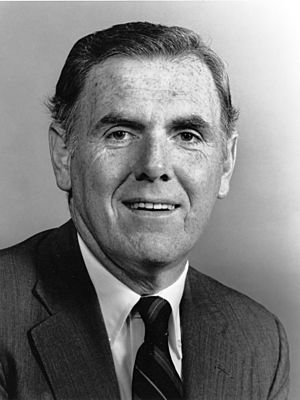
Flynn around 1984–1987
|
|
| 4th United States Ambassador to the Holy See | |
| In office September 2, 1993 – September 20, 1997 |
|
| President | Bill Clinton |
| Preceded by | Thomas Patrick Melady |
| Succeeded by | Lindy Boggs |
| Mayor of Boston | |
| In office January 2, 1984 – July 12, 1993 |
|
| Preceded by | Kevin White |
| Succeeded by | Thomas Menino |
| 49th President of the United States Conference of Mayors | |
| In office 1991–1992 |
|
| Preceded by | Robert M. Isaac |
| Succeeded by | William Althaus |
| Boston City Councilor | |
| In office January 1978 – January 2, 1984 |
|
| Preceded by | Louise Day Hicks and John J. Kerrigan |
| Succeeded by | N/A (number of at-large seats reduced) |
| Member of the Massachusetts House of Representatives | |
| In office January 1975 – January 1978 |
|
| Preceded by | Royal L. Bolling and Dorris Bunte |
| Succeeded by | Dorris Bunte |
| Constituency | 7th Suffolk |
| In office January 1971 – January 1975 Serving with Michael F. Flaherty Sr.
|
|
| Succeeded by | Elaine Noble |
| Constituency | 6th Suffolk |
| Personal details | |
| Born |
Raymond Leo Flynn
July 22, 1939 Boston, Massachusetts, U.S. |
| Political party | Democratic |
| Spouse | Catherine Coyne |
| Children | 6 (including Ed) |
| Parents | Stephen Flynn Lillian Kirby Flynn |
| Alma mater | Providence College (BA) Harvard University (MA) |
| Military service | |
| Allegiance | |
| Branch/service | |
Raymond Leo Flynn (born July 22, 1939) is an American politician who served as the mayor of Boston, Massachusetts, from 1984 to 1993. Before becoming mayor, he was a star college basketball player. After his time as mayor, he became the United States Ambassador to the Holy See, which is the government of the Catholic Church in Vatican City.
Flynn was known for his focus on helping Boston's neighborhoods. He was a member of the Democratic Party. During his political career, he was known for supporting workers and families while also holding conservative views on social issues. He worked to improve housing, fix the city's budget, and bring people from different backgrounds together.
Contents
Early Life and Basketball Career
Raymond "Ray" Flynn grew up in the South Boston neighborhood. His father was a dockworker, and his mother was a cleaning lady. As a kid, he was a "ball boy" for the famous Boston Celtics basketball team.
Flynn was a talented athlete and earned a basketball scholarship to Providence College. He became an All-American player, which means he was recognized as one of the best college players in the country. In 1963, his team won the National Invitation Tournament (NIT), and he was named the Most Valuable Player.
After college, Flynn was drafted by the Syracuse Nationals of the NBA. He played professionally for a short time. He later served in the United States Army. Before entering politics, he worked as a high school teacher and a probation officer, helping people who had been in trouble with the law.
Start in Politics
Flynn used his fame as a local sports hero to win a seat in the Massachusetts House of Representatives in 1970. He represented his home neighborhood of South Boston. He supported trade unions, affordable housing, and rights for people who rent their homes.
Boston's Busing Crisis
In the 1970s, Boston went through a difficult time called the busing crisis. A court ordered the city to bus students to different schools to create more racial diversity. This caused a lot of anger and division in the city.
Flynn was against the court-ordered busing plan. He argued that it forced poor white and poor Black families to compete in a struggling school system. However, he also spoke out against violence and refused to join leaders who used angry and divisive language. This made him unpopular with some people in his own community.
Boston City Council
From 1978 to 1984, Flynn served on the Boston City Council. He became known as a hard-working councilor who fought for the rights of everyday people. He stood up to big utility companies that wanted to raise prices and worked to protect renters. He built a reputation as a champion for the city's neighborhoods, not just the wealthy downtown area.
Mayor of Boston (1984–1993)
In 1983, Flynn ran for mayor of Boston and won. He promised to be a "people's mayor" who would focus on the city's neighborhoods. He was very popular and was reelected twice, in 1987 and 1991.
As mayor, Flynn was known for being very hands-on. He would often show up at fires or other emergencies to support people and city workers. He worked to make life better for all of Boston's citizens.
Fixing the City's Budget
When Flynn became mayor, Boston had a large budget deficit, meaning it was spending more money than it had. He worked hard to balance the budget. He convinced the state government to give Boston more money and allow the city to raise its own funds through new taxes. By the time he left office, the city's finances were in much better shape.
Working for Neighborhoods and Housing
Flynn believed that big developers building new skyscrapers downtown should help the rest of the city. He created a "linkage" program that required developers to pay a fee. This money was used to build thousands of affordable homes for families.
He also fought for rent control laws to keep housing costs from rising too fast. His administration gave neighborhood groups more power in planning what was built in their communities. In one famous case, he gave a neighborhood group in Roxbury the power of eminent domain, which allowed them to take control of abandoned properties and fix them up.
Improving Race Relations
Boston had a history of racial tension, but Flynn worked to heal these divisions. He helped Black families move into public housing in white neighborhoods to promote integration. He also created a "Boston jobs" program. This rule required that construction projects hire a certain number of Boston residents, minorities, and women.
However, his administration faced criticism in 1990. Black leaders were upset with how the Boston Police handled the investigation into the murder of Carol Stuart. This led Flynn to create a special commission to review the police department and make changes.
National Leadership
As mayor, Flynn became a national voice for cities. He served as president of the United States Conference of Mayors. He argued that the federal government needed to support cities with funding for housing, jobs, and other programs. He also traveled to South Africa to support anti-apartheid leader Nelson Mandela.
Ambassador to the Holy See
In 1993, President Bill Clinton appointed Flynn to be the U.S. Ambassador to the Holy See. The Holy See is the central government of the Roman Catholic Church, located in Vatican City. Flynn was the first Democrat to hold this position.
As ambassador, he did more than just represent the U.S. to the Pope. He also traveled to places like Bosnia, Haiti, and Somalia to help with humanitarian aid efforts. He played a role in helping Israel and the Holy See establish formal relations. He served as ambassador until 1997.
Later Life and Legacy
After his time as an ambassador, Flynn returned to Boston. He ran for a seat in the U.S. Congress in 1998 but did not win. He has remained active in public life, often speaking out on political and religious issues. He has also written columns for newspapers like the Boston Herald.
Flynn is married to Catherine "Kathy" Coyne, and they have six children. Their son, Ed Flynn, was elected to the Boston City Council in 2017, following in his father's footsteps.
In 2017, Boston's cruise ship terminal was renamed the Flynn Cruiseport Boston in his honor. He is remembered as a mayor who cared deeply about the people in Boston's many neighborhoods.
See also
- 1971–1972 Massachusetts legislature
- 1973–1974 Massachusetts legislature
- 1974–1975 Massachusetts legislature
- 1975–1976 Massachusetts legislature
- 1977–1978 Massachusetts legislature
- Timeline of Boston, 1980s–1990s


